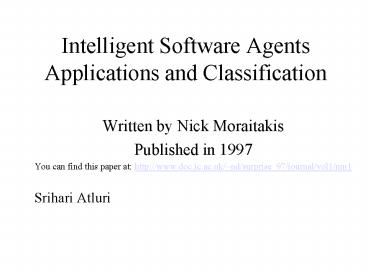Intelligent Software Agents Applications and Classification - PowerPoint PPT Presentation
1 / 12
Title:
Intelligent Software Agents Applications and Classification
Description:
What types of agents can be identified. What are the properties and characteristics with respect to which aforementioned ... Who is currently investigating agents? ... – PowerPoint PPT presentation
Number of Views:124
Avg rating:3.0/5.0
Title: Intelligent Software Agents Applications and Classification
1
Intelligent Software AgentsApplications and
Classification
- Written by Nick Moraitakis
- Published in 1997
- You can find this paper at http//www.doc.ic.ac.u
k/nd/surprise_97/journal/vol1/nm1 - Srihari Atluri
2
Abstract
- This paper aims to answer the following questions
- What are agents
- What types of agents can be identified
- What are the properties and characteristics with
respect to which aforementioned identifications
can be achieved.
3
Agents applications
- To begin with we first ask the questions
- Who is interested in agent technology? And
- Who is currently investigating agents?
- Personal Assistants Self-Contained systems that
schedule, organise and optimize personal
productivity tasks. Example Mail filtering
4
Agents applications -2
- Visitor Hosting Systems The hosting and
scheduling of activities , meetings and events
participated to by visitors at site, are
organized and coordinated through the cooperation
of local agents with the visitors, personal
agents. - Data Mining Information-specific agents provide
a context for data searches in vast databases or
other information sources (like the web for
example) from which, cooperating intelligent
personal agents will extract a selection of
useful information. This field is one of the
fastest-evolving ones at the moment given the
explosive growth of the amount of accessible
information via networks and communications
5
Agents application -3
- Network Management Collaborative agents collect
and exchange local information on network
statistics in order to achieve automation and
optimization of decisions on network
administration tasks like routing, access,
service provisions, monitoring and statistical
evaluation, within a global view. - Air/Land Traffic Control A multi-agent system
is installed in both controlling sites and
travelling vehicles to help resolve control
decisions in routing and scheduling
6
Agenthood
- Definition of Agent An agent ha the following
properties. - Autonomy the ability to self support its
operations and to retain control over its actions
and internal states - Social ability the ability to interface and
interact with other agents via communication
language - Reactivity Behavior according to which
perception of environmental changes results to a
response by the agent in a timely fashion - Proactiveness the ability to take the initiative
and thus exhibit, self-contained goal-directed
behavior
7
Agent types
- Classification criteria
- Mobility
- Behavioral model
- Primary attributes
- Roles
8
Collaborative agents
- Focused into autonomy, cooperation, a little of
learning - Uses autonomy, responsiveness and proactive ness
to achieve negotiation. - They are static
- Suitable for
- problems too large, need distribution
- need for interconnection
- enhancement of modularity is of prime interest
9
Interface agents
- Focused in autonomy, learning and whose goal is
to perform tasks for the owner - Examples
- personal organisers
- informational filters
- financial decision systems
- tutorial systems
10
Mobile agents
- Move around the WAN, interact with remote hosts,
collect information on behalf of the owner, and
return to the home. - Exhibits social ability, proactive ness and
autonomy - Used in
- less local recourses and need for remote
recourses - where asynchronous distributed computation is
needed - bringing remote information is expensive
11
Information agents
- Used to filter down the unmanageable large
information to select the most useful pieces is
needed. Information agents are tools that
coordinate the retrieval, management, selection
and manipulation of information. They may be
mobile or collaborative, and perhaps they will
exhibit many of the properties (especially the
learning ones) of interface agents.
12
Conclusion
- Explosive growth
- Major role in the following years































